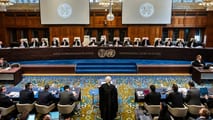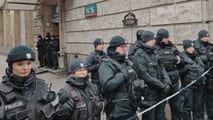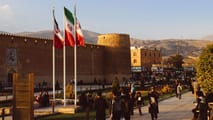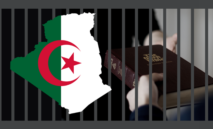

Places of worship closed during Covid: will the ECHR dare to condemn abusive restrictions?
Places of worship closed during Covid: will the ECHR dare to condemn abusive restrictions?
In hindsight, the restrictions imposed by Western governments to curb the spread of Covid-19 appear increasingly disproportionate. However, the European Court of Human Rights (ECtHR) has thus far dismissed the majority of complaints concerning serious infringements of fundamental freedoms. Regarding the suspension of worship in 2020, only one case against France is currently under examination by the ECtHR.
The case of Mégard v. France (No. 32647/22), brought before the ECtHR in June 2022, related to the prohibition of all gatherings or meetings within places of worship, except for funeral ceremonies, limited to thirty people. This radical measure was outlined in Article 47-I of Decree No. 2020-310 of October 29, 2020, issued during the second lockdown. Even though places of worship could remain open, the exercise of religious freedom was completely restricted, with all ceremonies (except funerals) being banned. The decree even provided for the closure of these establishments if the previous provision was not adhered to (Article 47-IV of the decree).
Asserting rightly that the effective exercise of his religious freedom was wiped out during this lockdown, Mr. Mégard requested the annulment on grounds of ultra vires, of Article 47-I of the contentious decree. Following the rejection of his request by the French Council of State (Conseil d’État), Mr. Mégard lodged an application before the ECtHR. The question the Court agreed to address is whether the total prohibition of all gatherings of meetings within places of worship disproportionately infringed upon the freedom of religion, guaranteed under Article 9 of the European Convention on Human Rights.
Article 9 of the Convention protects the freedom of thought, conscience, and religion, but several restrictions are possible and provided for in paragraph 2 when they are necessary “in a democratic society,” to ensure the protection of public health. However, this should not in any way serve as a blank check for the State to function as its discretion by completely restricting all our freedoms. In fact, the State must justify with circumspection when enacting certain coercive measures. However, this was not what the Grand Chamber of the Court demanded in the case of the Geneva Trade Union Action Community, which refers to a general and absolute prohibition of all public gatherings in Switzerland, still within the framework of the fight against Covid. On March 15, 2022, the ECtHR condemned Switzerland on the grounds that the margin of appreciation afforded to Member States does not allow them to justify radical and general regulatory restrictions. However, on November 27, 2023, the Grand Chamber considered the application inadmissible because it was submitted out of the time and furthermore, the applicants had not exhausted domestic remedies. This decision is highly questionable since the Grand Chamber sidesteps the substantive issue by implicitly humiliating the Chamber of the 3rd Section, which allegedly failed to notice that the application was submitted out of time…
Another case illustrating the ECtHR reluctance to rule on Covid-related restrictions is the Magdić v. Croatia application. On September 1, 2022, the ECtHR dismissed this application on the grounds that the applicant did not “specify which public gatherings he could not attend due to the measures[1]”. If the ECtHR is willing to examine the pending case, it will note that Mr. Mégard clearly states his status as a Catholic and that, under the application of Article 47-I of the contentious decree, he was forced to interrupt his personal and collective religious practice.
According to the ECLJ, the decisive element in this case could be the imposed limit of thirty people during funerals, the only authorized ceremonies during the second lockdown within places of worship. The freedom to manifest one’s religion or beliefs may be subject to proportionate restrictions, but not to general and absolute restrictions that would undermine the core of religious freedom. In this case, there is not only a general and absolute prohibition of all religious ceremonies, which completely prevents collective worship, but there is also a lack of scientific and reasonable basis for this limit of thirty people. It is essential to question the objective reason for justifying this threshold of thirty people, given that each place of worship has a variable surface area, which directly influences the risk of Covid transmission. Moreover, this limit of thirty people was eventually abandoned following an order from the Council of State dated November 29, 2020[2].
According to the ECtHR, “for a measure to be considered proportionate and necessary in a democratic society, the existence of a measure causing less serious harm to the fundamental right and achieving the same goal must be excluded[3].” In the context of the Covid-19 pandemic, the Court should not lower its standard regarding the protection of fundamental rights. Thus, in another case, the ECtHR validated a national measure restricting the freedom of movement of the applicant, as the latter still had numerous opportunities for outings and could still engage in social contacts. The interference was deemed proportionate by the Court as it did not entirely extinguish the possibility for the applicant to exercise his right to freedom of movement.
In this case, the restrictions imposed by France provide no opportunity for the exercise of the most important practice in the Catholic religion, namely participation in Mass. Moreover, it is difficult to see how the State could justify the need for the limitation of thirty people during funeral ceremonies and the prohibition of other ceremonies, especially when nurseries, schools and colleges remained open with reinforced sanitary protocols. France should not have treated religious activities more restrictively than similar secular activities. In this regard, the Supreme Court of the United States addressed the glaring difference in treatment between religious and secular activities and concluded that this difference in treatment was not justified because the risk of contamination was not higher in a place of worship compared to other activities[4].
Furthermore, the State does not have the authority to judge the more or less essential nature of certain religious practice, nor to unilaterally regulate the details of religious practices. “The duty of neutrality and impartiality of the State is incompatible with any power of assessment on its part regarding the legitimacy of religious beliefs or their expression modalities[5].” This notably results in the duty for the state to organize with neutrality and impartiality “the exercise of various religions, cults, and beliefs[6].” Thus, the choice made by the State to authorize religious funerals to the exclusion of any other religious practice is not neutral and can be perceived as arbitrary when considering the fact that for Catholics, Sunday worship is a religious obligation, which is not the case for attending funerals. A US District Court in Columbia reiterated this principle: it is not for authorities “to say that religious beliefs about the necessity of gathering together as one body are mistaken or non-essential[7].” By deciding to authorize certain religious practices rather than others, public authorities extend their role. Public authorities also extend their role when they claim to prescribe how religious practices such as the rite of communion or chants should take place, or impose, as was sometimes the case in France, the Mass be celebrated behind closed doors? Similarly, the decision made by some governments to allow a fixed number of worshipers to be present in places of worship, without considering their size, as it was in France, is also arbitrary. To avoid such arbitrary restrictions that undermine the neutrality of the state and the autonomy of religious communities, public authorities must, as much as possible, consult with the religious communities involved.
Four years after the eruption of Covid-19, the suspension of worship is among the restrictive measures that now appear to be very disproportionate. As analyzed in this article by Grégor Puppinck, director of the ECLJ (European Centre for Law and Justice), the fear of Covid has had a staggering effect on citizens and episcopal conferences, which have widely accepted restrictions on freedom of worship. Despite the thousands of appeals sent to ECtHR regarding severely infringed fundamental freedoms, only a handful[8] have been accepted. The ECLJ has intervened as a third party in several of these cases, notably two cases against Romania, Constantin-Lucian Spînu and Mihai-Silviu Chirilă. May the Court have the courage to condemn France in this matter, as its classical jurisprudence would require.
For further reading:
- Grégor Puppinck: “Covid: Religious Freedom Breached”
- Complete list of written observations by the ECLJ submitted to the ECHR
___________
[1] The ECLJ intervened as a third party in this case. Read our written submissions.
[2] CE, Ord., 29 novembre 2020, Associations Civitas et autres, req. n°446930, §§18-20.
[3] Glor v. Switzerland, n°13444/04; April 30,2009, §94.
[4] Supreme Court of the United States South Bay, United Pentecostal Church v Newsom (2021).
[5] See: Manoussakis and others v. Greece, n°18748/91, §47; Bayatyan v. Armenia [GC], n°23459/03.
[6] S.A.S c. France [GC], n°43835/11, 1er juillet 2014, §127.
[7] UNITED STATES DISTRICT COURT FOR THE DISTRICT OF COLUMBIA Capitol Hill Baptist Church v. Muriel Bowser, in Her Official Capacity as Mayor of the District of Columbia (CaseN°20-cv-02710 (TNM)) on 9 October 2020, page 11.
[8] View pending requests: Orthodox Ecclesiastical Obedience Association v. Greece, No. 52104/20 in which the ECLJ has submitted written observations as a third party and Figel' v. Slovakia, No. 12131/21, in which the ECLJ has also submitted written observations.











